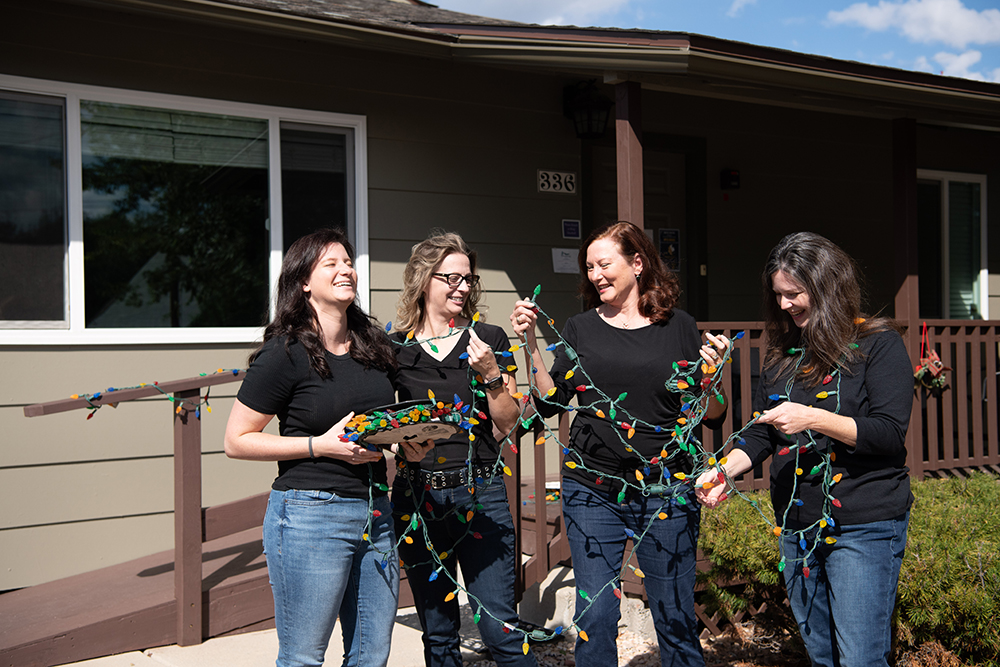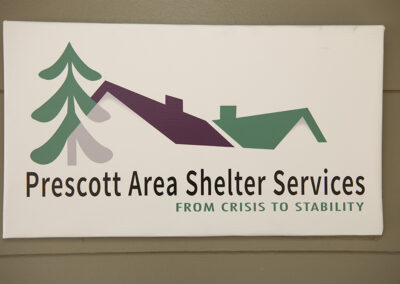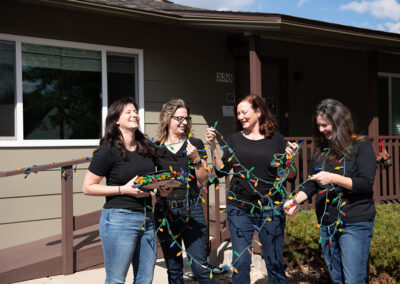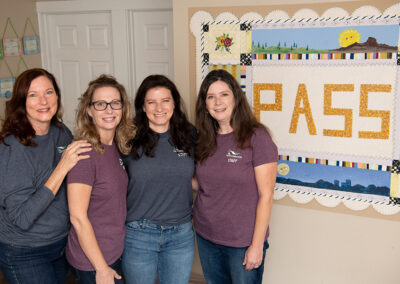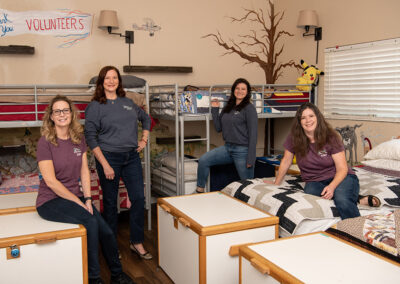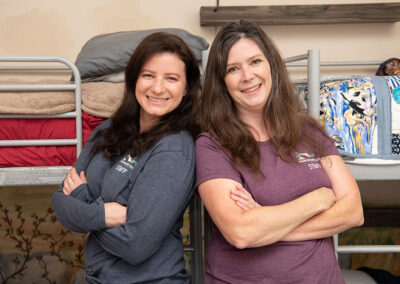Prescott Area Shelter Services gives women the support, resources, and guidance to rebuild and gain independence
By Hilary Dartt • Photos by Trisha Shaffer
The Prescott Area Shelter Services (PASS) mission statement is simple: To serve women, women with children, and veterans by providing temporary housing, resources, individualized case management, and a pathway to permanent housing.
For the women, PASS serves, though, the benefits are complex and life-changing.
PASS offers emergency shelter to women (and their children) for up to 90 days. During that time, guests receive support and resources to gain independence; they must actively look for work and housing, but they’re not on their own.
Case Manager Danielle Hollinger meets weekly with guests to offer them guidance on everything from doctor appointments to banking to finding jobs and housing. She also connects them with resources and holds them accountable, checking in to make sure they’re taking action to reach their goals.
The model works: PASS has an 84% success rate to permanent housing.
“I knew this was the place that would enable me to get back up and take care of myself and have a life,” said Theresa Lammie, a guest who came to stay at the shelter this past summer. “I can be on my feet, gain independence, and be part of the community.”
Theresa said she moved into the PASS shelter after a series of poor choices and a habit of putting herself last broke her. It was a rock-bottom moment … but now, she said, she has a chance to rebuild.
“You don’t expect to be here,” she said of ending up at a shelter. “You think you’re invincible. That’s why it’s really important to take care of yourself and have the ability to do it.”
PASS has given her that—and the opportunity to focus on creating a life she wants. She’s very close to finishing her paralegal degree, and attributes much of her success to the shelter’s “life-changing environment.”
“It’s amazing what they can do,” said another guest, Cindy (to protect her privacy, we’re not using her real name). “If you have a problem, they put their heads together to get you in the right direction.”
Cindy came to the shelter with her two sons after leaving a domestic violence situation, and said, “we are very thankful for what they do here.”
Cindy’s 16-year-old son initially felt uncertain about staying at a women’s shelter—he worried his presence would make them feel awkward. But, Cindy said, “Everyone’s talking to him, the little kids are chasing him down to play. The ladies have been just awesome with him.”
That sense of community is another thing both Cindy and Theresa said they appreciate.
“There is no judgment,” Cindy said. “Everyone seems to get along really well, and there is a lot of resource sharing among the ladies.”
“There’s just a really good energy,” Theresa said. “Everyone is from kind of the same situation as you, so you’re not getting the judgment you get ‘out there.’”
Most importantly, as guests transition to independence, they’re not alone.
PASS Executive Director Carmen Fredric said she’s always had a heart for helping people and has a special connection to the PASS mission because her father, a Korean War veteran, struggled with homelessness and addiction.
“I love that PASS helps with providing a safety net when people don’t have a place to go,” she said.
Working to carry out PASS’s mission, she said, is one way she can honor her dad.
Katee Norris, Director of Programs, came to PASS 10 years ago as an AmeriCorps VISTA. She felt so connected to the organization that she’s stayed on, and she loves PASS “because not only are people emergently served, but with our programs, growth, and vision, true change can and does happen.”
Thanks to generous community donations and lots of help, no dream, goal, or vision is out of reach.
Danielle, Case Manager, said her favorite thing about her work is watching guests transform as they become empowered to change their lives.
“They come in, broken, afraid, they lack self-confidence. They don’t think they can do it. They gradually change, and you can see them thinking, ‘I’ve got this.’”
“With the [guests] who want to change, who want to get on their feet and create a better life,” she said, “the change is drastic.”
The biggest thing she teaches guests, she said: “While you’re here, it’s okay to focus on yourself.”
Julie Brown Pflueger, Director of Marketing, joked that she teaches the Big Girl Panty Class, in which she guides guests in reaching goals in different parts of their lives. From self-talk to practical strategies (eating an elephant one bite at a time), Julie said she hopes her classes inspire and educate guests.
Her favorite thing about the services at the PASS emergency shelter, she said, is that it provides respite to guests whose lives have “been hit by the perfect tsunami.”
It gives them a chance, she said, “to turn around, calm down, and make some logical decisions that open the door to the next chapter of their lives.”
For Theresa, the respite is just what she needed: “This is a life-changing environment.”
How PASS Works: The Details
The PASS emergency shelter is in a 2700-square-foot house in Prescott. There are 19 beds in the main dorm, plus a separate two-room, seven-bed expansion above the community room, which has enabled PASS to offer shelter to women with older boys.
In addition to the front room (where women can sleep during Operation Deep Freeze, when temperatures drop below 35 degrees), the house includes a Case Manager’s office, a volunteer office (there are multiple volunteer opportunities at PASS), and a kitchen, community room, and a newly constructed playground.” PASS also runs a Transitional House for guests ready to take the next step.
Volunteers (individuals and organizations) prepare and drop off meals for the guests, cover the evening shift, overnight shift, and morning office hours. Community members donate hygiene items, clothes, and more.
PASS offers several other supportive programs: the Homeless Transition Project, Education to Employability, the Transitional Housing program, Wheels to Work, Smile with Confidence, Operation Deep Freeze (in conjunction with the Salvation Army), and a Children’s Program. Learn more about these programs at https://prescottareashelters.org/services.
For more information or to donate to PASS, a 501(C)3, visit https://prescottareashelters.org

